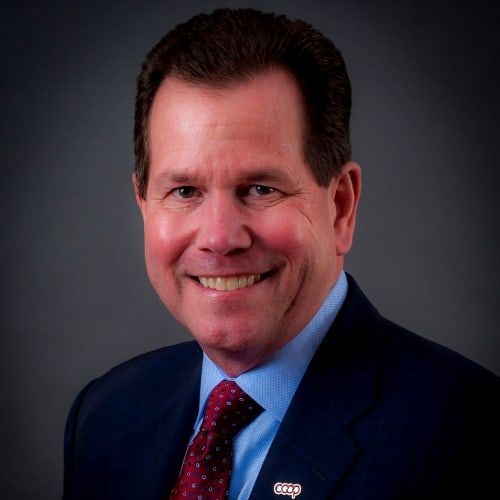
On 6 October 2022, Paul Hazen was inducted into the Cooperative Hall of Fame - the highest honor that the the United States cooperative community bestows - during a ceremony at the National Press Club in Washington, US. As Executive Director of the U.S. Overseas Cooperative Development Council (OCDC), he has devoted his career to elevating the cooperative voice domestically and internationally. He also created the OCDC International Cooperative Research Group, which has helped to measure the impact of and increase funding for international co-op development, leading to a 50% increase in Congressional funding to $18.5 million for the Cooperative Development Program. We interviewed him to find out more about his cooperative journey.
How has growing up in Western Wisconsin influenced your take on cooperatives? Were you introduced to this business model early on?
Paul Hazen: Western Wisconsin is home to many cooperatives, including producer co-ops such as Organic Valley, farm supply, electric, telephone and credit unions. I was formally introduced to cooperatives in my first job working for a Member of the US Congress, Alvin Baldus. Because cooperatives were his political base, we visited many and met with multiple cooperative leaders. After Congressman Baldus was defeated for re-election in 1980, I went to work for Kickapoo Council of Governments, a shared service cooperative of nine local municipalities. Following this, I worked for Rural Housing, Inc., an organisation that organised housing cooperatives throughout Wisconsin. I left that organisation to work for the National Cooperative Business Association CLUSA International (NCBA CLUSA) in Washington, DC in 1987.
You have devoted your career to elevating the cooperative voice domestically and internationally. How has the perception of cooperatives as development actors changed since you first started working in this field back in 1987 when you joined the National Cooperative Business Association CLUSA International (NCBA CLUSA)?
Paul Hazen: The perception of cooperatives is much more positive today than in 1987. The cooperative movement is riding a wave of popularity that began during the Great Recession of 2008 – 2009 when the US financial system collapsed and was bailed out by the federal government. Policy makers, business leaders and average people began looking for a better way to organise the economy than the traditional capitalist models. That search has continued with younger people, who are becoming more open to different business models and the triple bottom line of cooperatives that embodies the appealing triad of business success, social impact and environmental stewardship.
You were involved in setting up DotCooperation, which runs the .coop and .creditunion domains as well as acting as the custodian of the global Coop marque. What motivated you to support this project 20 years ago? What was the vision behind it?
Paul Hazen: In my role as Chief Executive of NCBA CLUSA, I was always looking for ways to raise the profile and public understanding of cooperatives. When the competition for new Top-Level Domains opened, we jumped at the chance to obtain DotCoop. There were over 125 new Top-Level Domains proposed and only six were selected. DotCoop was selected because we were able to demonstrate that cooperatives were global and had support from around the world. Our vision was to establish the DotCoop domain as a banner that all cooperatives could rally around to demonstrate the cooperative advantage.
Having been on the board of the ICA, how do you see the role of apex organisations in making the case for co-ops at global level, before international organisations such as the UN? (The work of apexes in terms of raising awareness about co-ops within international bodies like the UN. For example, having representatives from co-ops apexes at events where they talk about co-ops and how this has increased awareness among UN bodies and other international organisations.)
Paul Hazen: It is very important that cooperatives have a seat at the table with international organisations. The ICA has done an excellent job in representing cooperatives before the G20 by engaging cooperatives in the host country and bringing in key cooperative leaders from around the world. However, raising the profile of cooperatives cannot be done by APEX organisations alone – we need to work together to be effective. It is by our collective efforts that we can show the impact of cooperative before policy makers. To successfully make the case for cooperatives, we need data that demonstrates the cooperative impact, and APEX organisations can play a powerful role in data collection and dissemination.
How did OCDC participate in the 2022 Co-op Impact Conference?
Paul Hazen: The Cooperative Impact Conference is one of the many ways NCBA CLUSA and OCDC influences domestic and international policy makers on the impact of cooperatives for economic and social justice. The conference is also an excellent opportunity to showcase OCDC’s members (ACDI/VOCA, Equal Exchange, Frontier Co-op, GENEX, Global Communities, HealthPartners, Land O’Lakes Venture37, NCBA CLUSA, NRECA International, and World Council of Credit Unions) and their international cooperative development work. We are intentional in engaging with our partners in the developing world and bringing together leaders in economic development to showcase our work. During the event, OCDC announced the release of our latest white paper titled, From the Ground Up – Partnering with Cooperatives on Locally Led Development, that showcases how cooperatives are the best development partner when localisation is the goal. Cooperatives are leaders in empowering people and the Cooperative Impact Conference demonstrated this both domestically and internationally.




